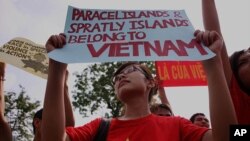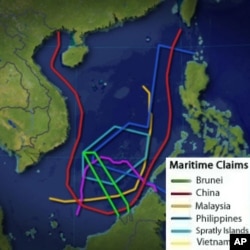Vietnam’s navy has conducted live-fire artillery drills off the country’s central coast following increased tensions with China over control in the South China Sea.
The naval exercises began near an unoccupied island 40 kilometers from Vietnam’s central coast, in an escalation of tensions between Vietnam and China over disputed waters within the South China Sea.
Vietnamese government officials called the exercises “routine training," but Chinese state media, quoting academics, strongly criticized the drills as “a military show of force to defy Beijing.”
Competing claims
The growing tensions between Vietnam and China follow accusations by both nations of intrusions into each other’s territorial waters in the South China Sea, reported to be rich in oil and gas reserves.
Indonesia, Taiwan, Brunei, Malaysia, the Philippines, as well as China and Vietnam, have competing claims over the sea area that is marked by several island archipelagos.
Carl Thayer, a political scientist at the University of New South Wales in Australia, says after Vietnam navy’s live-fire exercise, the question is now how China will react.
“China is ... being heavy handed to stop oil exploration activities in its waters," says Thayer. "And since its claims overlap it’s a question now how far is China going to push it because China has not responded to any of these issues in a conciliatory fashion.”
Also Monday, the Philippines government announced it is changing how it refers to an area in the South China Sea, where it has competing claims with China. A government spokesman says the waters surrounding the disputed Spratly Islands will now be called the West Philippine Sea.
Vietnam protests
|
Disputes in the South China Sea 1988, March - China sinks three Vietnamese vessels near the Spratly Islands, killing more than 70 Vietnamese. 1991 - China passes the Law on Territorial Waters and Their Contiguous Areas, laying out its claim to territorial sovereignty over the Paracel and Spratly Islands. 1995, 1999 - The Philippines discovers Chinese constructions on Mischief Reef, an island located in the Spratly Island chain. Despite efforts to resolve the dispute, more structures are found on the reef in 1999. Manila says the structures are a military installation while Beijing says they are for fishermen. 2002 - China and the Association of Southeast Asian Nations sign a non-binding Declaration of Conduct of Parties in the South China Sea. 2009, March – Chinese ships and fishermen harass a U.S. naval vessel in the South China Sea. According to the Pentagon, the Chinese vessels harassed the Impeccable, about 120 kilometers off Hainan island, south of China. 2011, May – Chinese vessels cut an exploration cable on a Vietnamese oil survey ship in waters, within Vietnam's exclusive economic zone. 2011, June - The Philippines complains that Chinese ships offloaded building materials and erected marker posts on reefs to the west of its island of Palawan, within Manila's exclusive economic zone. |
The tensions with Vietnam have led to rare nationalist anti-Chinese protests, which Vietnamese authorities have allowed to take place outside the Chinese Embassy in Hanoi.
On Sunday, one man in the demonstration was seen with a banner reading, “China! Stop violating territorial water of Vietnam.”
One Hanoi demonstrator called for protests over what he termed an intrusion in Vietnam’s territorial waters and land. He told the crowd the Vietnamese have strongly protested China’s actions, accusing Beijing of killing fishermen and urging China to stop its slander.
Vietnam also called for international mediation into the dispute. China has said it wants to settle the issues on a bilateral basis. The United States has expressed concern over recent developments saying the displays of force could lead to heightened tensions.
Ripple effects
But Thayer says the conflict could also impact ties within the Association of Southeast Asian Nations (ASEAN), which has boosted links among East Asian nations such as China as well as with the U.S. and Russia.
“If the U.S. should take some action it’s just going to make China adopt an even more hardline. And I would suspect that it would even wreck the East Asian Summit because a majority of countries would take a line against China,” Thayer says.
The territorial disputes with China area expected to be a major issue during the ASEAN Regional Forum in July. The East Asia Summit, which Asian leaders and the U.S. president are expected to attend, is scheduled for November.
| Discuss this story and others on VOA forums |





